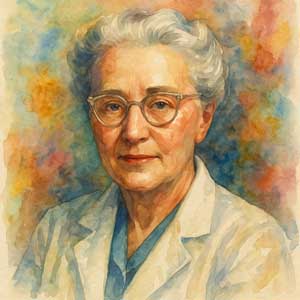— Virginia Apgar
 Dr. Virginia Apgar (1909–1974) changed the world—one newborn at a time. Born in Westfield, New Jersey, she became a pioneering anesthesiologist whose work ensured that newborns received the care they needed in the moments that matter most.
Dr. Virginia Apgar (1909–1974) changed the world—one newborn at a time. Born in Westfield, New Jersey, she became a pioneering anesthesiologist whose work ensured that newborns received the care they needed in the moments that matter most.
She created the Apgar Score in 1952 to evaluate a baby’s heart rate, respiration, reflexes, muscle tone, and skin color. Scored at one and five minutes after birth, her system saved lives and became the global standard for infant care.
“Women have to be so much better at things than men do to be recognized in society,” she once said. Still, Apgar soared. She played the violin, flew planes, gardened, and handcrafted musical instruments—always approaching life with curiosity and compassion.
Later in her career, Apgar joined the March of Dimes, focusing on preventing birth defects. Her work helped generations of families and inspired a stamp in her honor in 1994. The tribute was more than deserved.
Her life proved that swift, compassionate action can shape destinies. With every heartbeat she measured, Dr. Apgar affirmed that love in motion is the truest form of medicine.✨Virginia Apgar is recognized on the Top 100 Innovators list for her groundbreaking Apgar Score—a simple idea that has saved millions of newborn lives. 👶💡
 Care and urgency make life safer for our smallest hearts. 🍼
Care and urgency make life safer for our smallest hearts. 🍼
